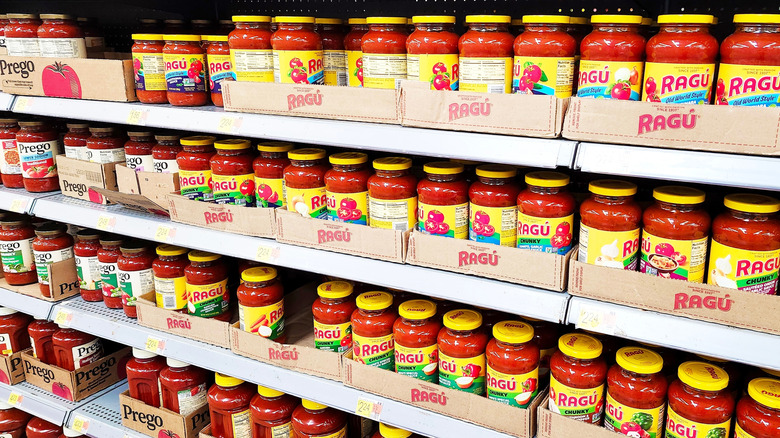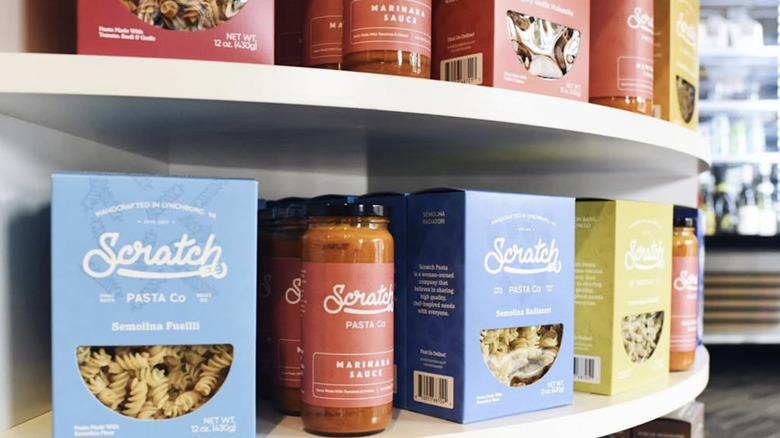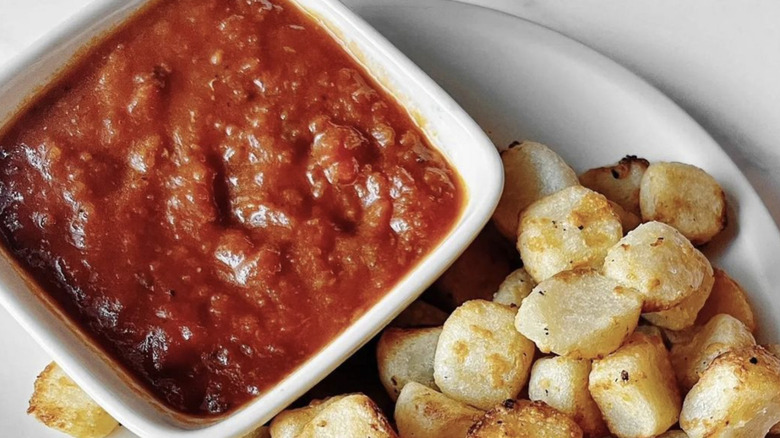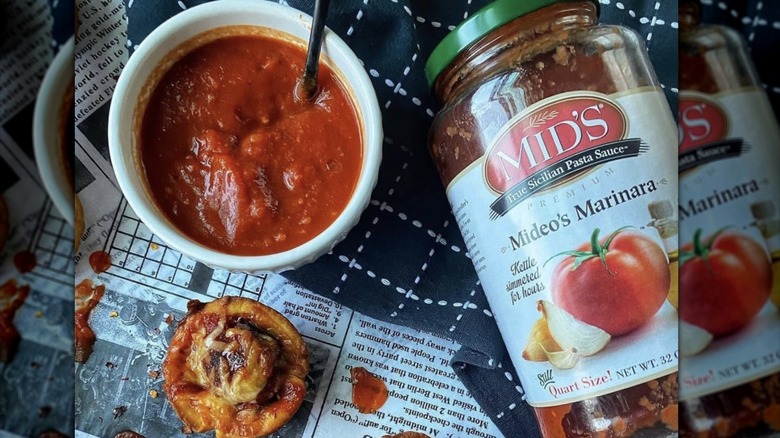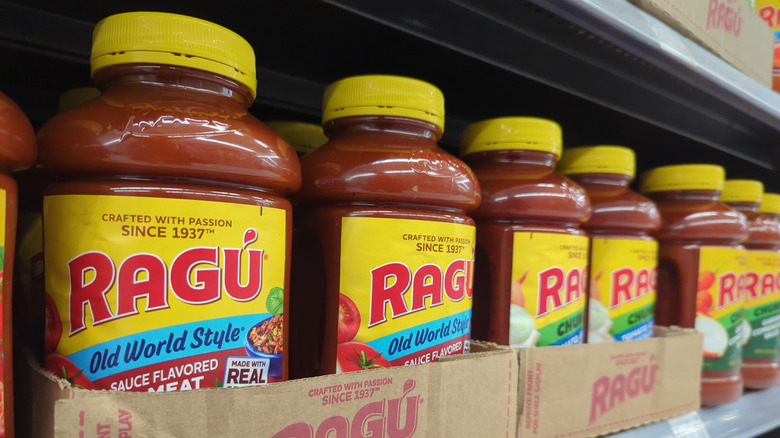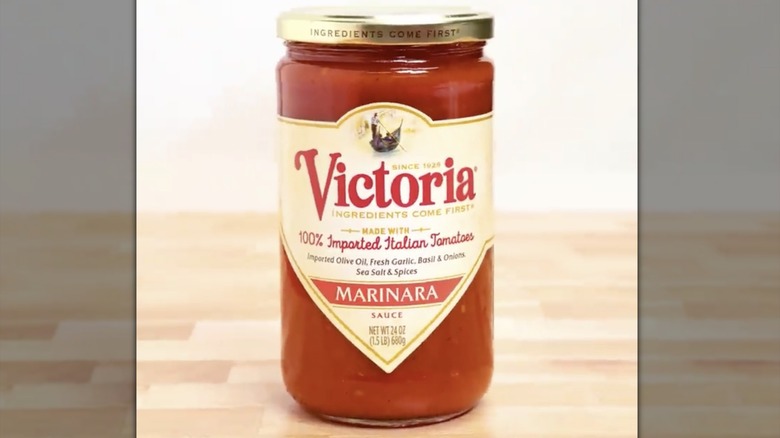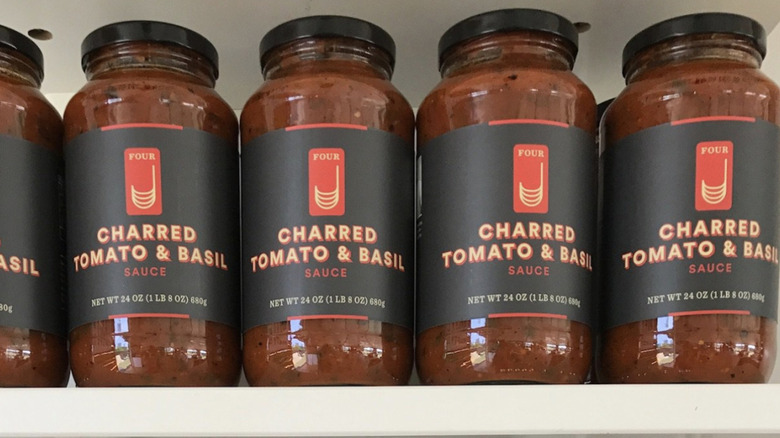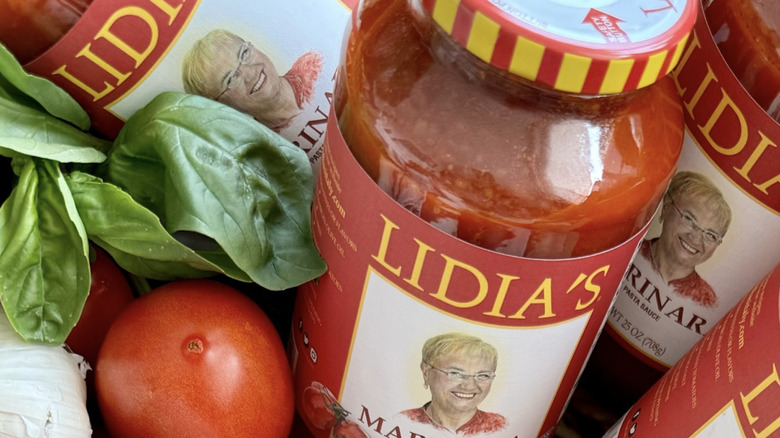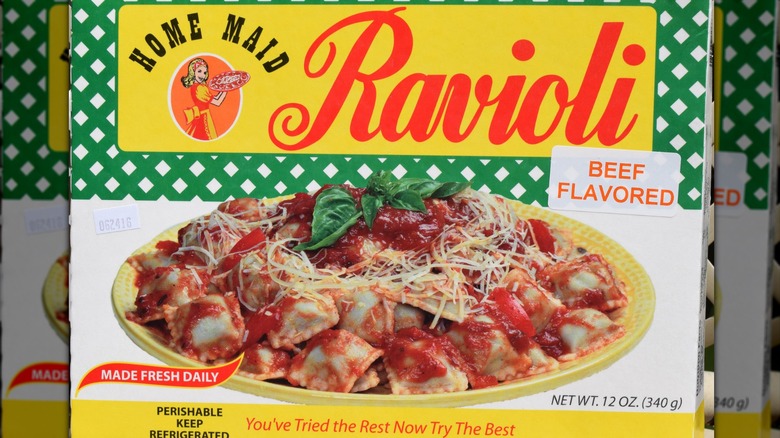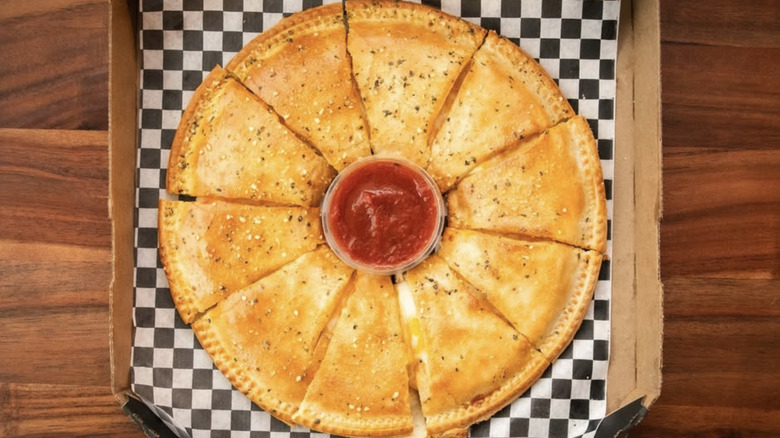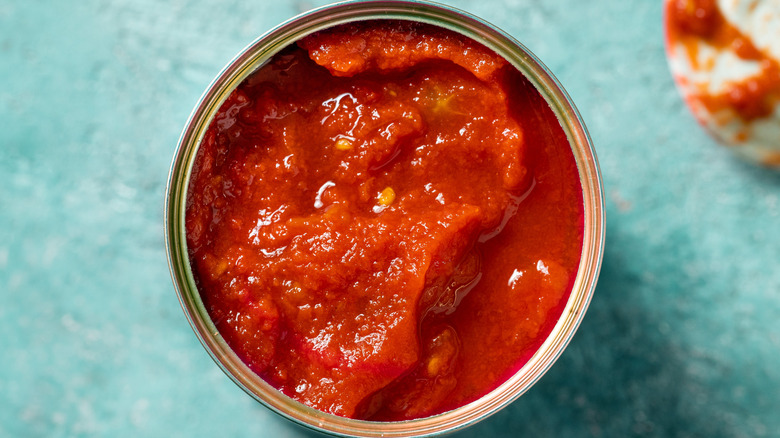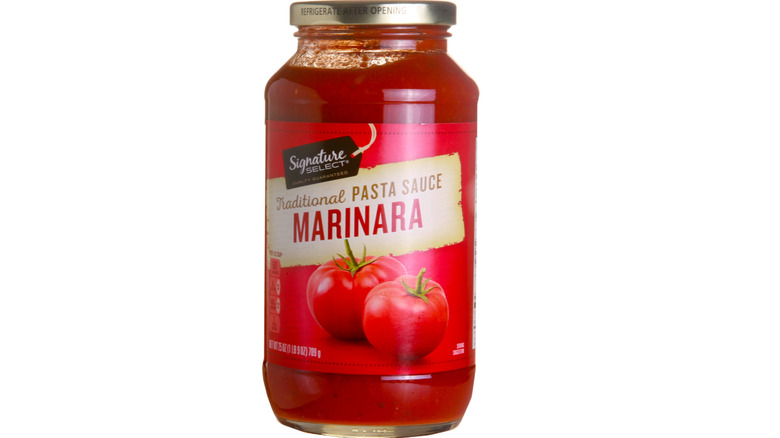The Biggest Marinara Sauce Recalls In US History
We may receive a commission on purchases made from links.
A simple dish of pasta and marinara sauce makes for a satisfying supper, and thanks to the many brands selling ready-made marinara, it's incredibly easy to prepare (this homemade marinara recipe is, too). Yet for some sauce manufacturers, the quick and convenient becomes complicated when their products get recalled. Food recalls have infiltrated just about every aisle of the supermarket at one time or another, including those innocuous jars of marinara sauce many of us keep stocked in the pantry. Some marinara sauce recalls in the U.S. have been nothing short of huge.
Whether a marinara sauce is imported into the U.S. or produced domestically, it must comply with the food safety standards enforced by the United States Department of Agriculture (USDA) and the U.S. Food and Drug Administration (FDA). If a food does not meet these standards, the company that makes it must recall the product. If you're wondering what could go so wrong with marinara sauce, the answer is: a lot of things.
Many of the biggest marinara sauce recalls have fallen under two of the most common issues processed foods fall victim to: undeclared ingredients and foreign material contaminations. Sauces that are recalled for these reasons compromise the safety of consumers because at the end of the day, we deserve to know what's inside the foods we eat. These are the sauce brands that didn't get the production process right, and accounted for some of the biggest marinara recalls in American history.
Scratch Pasta Co. Marinara Sauce in 2023
Lynchburg, Virginia-based Scratch Pasta Co. is the kind of business consumers should be supporting. It's newer (founded in 2017), small-batch, fresh quality, and female-owned. Yet it wasn't Scratch Pasta's noodles that blipped the FDA's radar, it was the marinara sauce. On December 13, 2023, Scratch Pasta Marinara Sauce was implicated in a substantial recall after it was found to contain undeclared milk.
Scratch Pasta's marinara sauce is bottled by Carolina CoPacking LLC in Henderson, North Carolina. When inspectors from the North Carolina Department of Agriculture (NCDA) stopped by the facility for a visit, they picked up on a problem with the Scratch Pasta sauce. Although the ingredients list on the sauce's label included butter and denoted that the butter was made from cream and natural flavor, inspectors took issue with the fact that the packaging did not clearly state that the sauce contained milk — a major allergen. Scratch Pasta issued a voluntary recall for 304 cases of marinara sauce.
Scratch Pasta's ambiguous labeling warranted a Class II recall designation from the FDA. According to the Food Allergen Labeling and Consumer Protection Act of 2004 (FALCPA), all food processors are required to list the common name of any major allergen on the product's packaging. The FDA list of major allergens includes milk, peanuts, tree nuts, fish, shellfish, eggs, wheat, soybeans and as of 2023, sesame. Scratch Pasta only shipped the mislabeled marinara sauce to one customer in Virginia, nonetheless, the recall quantity totaled 2,793 pounds.
Hungry Root Marinara Sauce in 2023
Since 2015, Hungryroot has made a name for itself as a grocery-delivering, meal plan-making subscription service that caters to consumers who want to eat simple, nourishing food. Over the years, Hungryroot has developed and sold a collection of grocery items under its own namesake label, including marinara sauce. Hungryroot touts the benefits of high-quality food, yet a recall in July 2023 forced the company to reconcile with the subpar state of its namesake sauce.
Hungryroot Marinara Sauce and Hungryroot Creamy Vodka Sauce were recalled for containing mold and elevated levels of yeast. Multiple lot codes of each sauce were looped into the recall quantity, with 12,840 units of Creamy Vodka Sauce and 81,312 units of Marinara Sauce deemed unfit for consumption. The Class II recall was voluntarily issued by BC Gourmet USA of Gloucester, Massachusetts, the company responsible for manufacturing Hungryroot's sauce. The circumstances of how such a huge amount of sauce became spoiled was not made public.
Hungryoot's hefty sauce recall amounted to 61,199 pounds. It wouldn't be the last time Hungryroot's Italian offerings were implicated in a big product recall. In November 2024, Hungryroot Ricotta Stuffed Shells were recalled over a potential contamination of Listeria monocytogenes, a dangerous foodborne pathogen.
Mideo's Marinara Sauce in 2021
Since 1938, Mideo's Marinara Sauce, or Mid's as it's also known, has been imparting the traditional flavors of Sicily to the American public one jar at a time. On May 11, 2021, business got tough for the veteran sauciers. Several lots of Mideo's Marinara Sauce were found to contain elevated levels of potassium that differed from what the jars' nutrition facts label indicated. This made the product label inaccurate and a recall was necessary.
The recall made 20 batch numbers of Mid's marinara unsaleable. These batches comprised a total of 159,942 jars — a huge loss for Mideo's. The 32-ounce jars of sauce were manufactured by RC Industries of Navarre, Ohio and distributed to nine states. It is unclear whether the elevated potassium levels in the sauce were discovered through in-house product testing or during a food safety inspection conducted by a municipal department.
It is important that the numeric amounts of vitamins and minerals listed on food packages are accurate. The average person might not be scanning food labels for potassium information, but some people have to for health reasons. For consumers with conditions like hyperkalemia, a kidney disease that results in too-high levels of potassium in the body, keeping track of potassium levels in their diet is crucial to their well-being. Lucky for Mideo's, there were no illnesses reported in connection to the mislabeled marinara.
Ragú Old World Style Traditional sauce in 2019
In June 2019, one of the biggest names in the marinara sauce game was at the center of a mega, multi-product recall. After finished product testing of certain jars revealed fragments of plastic inside the sauce, Ragu's manufacturer, Mizkan America Inc., issued a recall for foreign object contamination. The affected sauces were: Ragú Chunky Tomato Garlic & Onion, Ragú Old World Style Traditional, and Ragú Old World Style Meat. The sauces were bottled in 45-ounce or 66-ounce jars and produced between June 4 and June 8, 2019.
At the time the recall was announced, Mizkan was confident that most of the contaminated jars were in the company's possession, however, jars from the affected lots were shipped nationwide. No instances of injury caused by the plastic inside the sauce were reported. The number of jars Ragú recalled was no joke — 9,130 cases of sauce were pulled, amassing a total weight of 216,202 pounds.
Huge recalls like this one can cost companies millions of dollars. On June 15, 2020 — exactly one year after its sauce recall, Mizkan announced its decision to pull Ragú out of the Canadian market. Whether these downsizing efforts were motivated by the COVID-19 pandemic, the 2019 recall, or a combination of the two was something Mizkan declined to specify.
Victoria Marinara Sauce in 2019
A product recall is something no business wants to go through, but when something goes sideways at the production plant, the best case scenario is to catch the mistake before the product hits stores. When Victoria Marinara Sauce was recalled on February 25, 2019 for undeclared tree nuts, there was nothing best case scenario about it. The mislabeled 40-ounce jars of sauce had already been shipped to stores and sold to consumers. One consumer with a cashew allergy had a reaction after eating the sauce. The complaint that was registered thereafter was what triggered Victoria's recall.
The 1,280 cases of marinara sauce Victoria had to recall (which weighed in at 19,200 pounds) was a heavy blow, but one could argue that even just one report of consumer illness or injury is a greater professional loss. Victoria's distributor, B&G Foods, urged customers who had purchased the marinara to return it to the place of purchase for a full refund. B&G's Executive Vice President of Operations, William Herbes, issued a statement saying, "The safety of our consumers is our number one priority ... The core values that we've embodied since the company was founded in the 1800s honesty, integrity, and accountability — guide our actions as we take the appropriate measures to address this issue."
Four J Charred Tomato & Basil Sauce in 2018
The concept behind Four J Foods had obvious potential for success. Three reputable professional chefs: Jonathan Waxman, Joey Campanaro and Jimmy Bradley, along with hospitality expert Jason Giagrande, united and became the Four J's selling coffee, vinaigrettes, mustard, and sauce. Four J's Charred Tomato & Basil marinara sauce sounds really appetizing — as long as you don't have allergies to fish, gluten, or soy. After it came to light in April 2018 that the Charred Tomato & Basil Sauce contained three undeclared allergens, the Four J's initiated a voluntary recall.
The mislabeled sauce was only distributed throughout the state of Texas, but the recall quantity was Texas-sized. Approximately 6,522 units of Charred Tomato & Sauce were pulled from Four J's inventory. The sauce was sold in 24-ounce jars and distributed by Cookwell & Company, a gourmet food business in Austin, Texas. Whether the marinara sauce recall was an omen or a catalyst for the Future of Four J Foods isn't clear — either way, the company's entrepreneurial endeavor (which included a coffee shop line inside H-E-B grocery stores throughout Houston) wouldn't last much longer. In 2021, after nine years in operation, Four J Foods went out of business.
Lidia's Marinara Sauce in 2017
Even a bonafide boss like veteran cook Lidia Bastianich encounters problems in the marinara sauce production process. Back in March 2017, Bastianich's marinara sauce, sold under the namesake label Lidia's, had to be recalled because of product mislabeling. A select number of jars labeled Marinara Sauce had accidentally been filled with Lidia's Vodka Sauce, which was made with milk. Selling vodka sauce in jars intended for marinara sauce created a potentially dangerous situation for consumers with milk allergies and dairy sensitivity. The FDA considered the mix-up of Lidia's sauces as high-risk and designated the recall as Class I.
Lidia's sauce was produced by Nonna Foods of Woodbury, New York. Before the error was caught, 25-ounce jars of vodka sauce labeled as Lidia's Marinara Sauce were distributed to 40 states and Washington, D.C. The recall accounted for approximately 750 jars, and although the distribution was widespread, no illnesses or allergic reactions were connected to the recall. Bastianich, an Emmy Award-winning television host, cookbook author, and restaurateur appears to have bounced back from the incident. Lidia's Marinara Sauce is still sold online and in stores.
Home Maid Pasta Sauce in 2016
Home Maid Ravioli Company of San Francisco, California likes to kick it old-school. It's got a bare-bones website, a robust Italian heritage, and three generations in the biz. In January 2016, something else Home Maid had was a big fat recall on its hands due to issues with its pasta sauce and frozen pastas. Home Maid was guilty of the same offense as many other marinara makers: ingredients in its sauce and pasta products weren't listed on the packages. Since one of the undeclared products was pork, (the other one was whey), Home Maid had to answer to the USDA rather than the FDA.
Home Maid's problems began when its facility was visited by the Food Safety Inspection Services (FSIS), an internal department within the USDA that inspects egg, poultry, and meat products. The FSIS uncovered a slew of Home Maid goods containing undeclared whey and/or pork that hadn't undergone federal inspection. Among the saucy items in the recall were boxes of ravioli with sauce and fillings ranging from cheese, chicken, and beef. There was also bagged and boxed rigatoni with sauce, bagged and boxed tortellini with sauce, bagged and boxed spaghetti with sauce, and plastic containers of Italian Style Pasta Sauce.
After the FSIS findings, Home Maid recalled 38,950 pounds of product. Home Maid's marinara sauce and frozen pasta products were sold and distributed throughout California. The recall was expanded three days after the initial announcement to include the spaghetti, tortellini, and rigatoni items.
Mazzio's Marinara sauce in 2012
Pre-made marinara sold at retail establishments aren't the only sauces to be part of big-time product recalls. Fast-casual pizza buffet chain Mazzio's based out of Tulsa, Oklahoma may not bottle up its sauce and put it on grocery store shelves, but that didn't prevent the restaurant from having one of the biggest marinara recalls ever.
On October 11, 2012, a total of 6,352 cases of boxed pouches of Mazzio's Marinara Sauce were recalled by the FDA because milk — a major allergen — was not declared as the source of butter inside the sauce. While many of us may glance at butter on the ingredients list of a sauce or any other processed product and assume that milk is part of that equation, the FDA doesn't operate on assumptions. The sauce was made by Paradise Tomato Kitchens Inc. of Louisville, Kentucky. The thousands of recalled cases contained 6.65-pound pouches of marinara sauce.
Mazzio's marinara sauce is typically combined with mozzarella cheese — it's a pizza chain after all — but once again, that's not a risk the FDA is willing to take. Mazzio's was a few thousand pounds short of its usual marinara supply after the recall, but it didn't cripple the eatery in a permanent way. Luckily, no reports of allergic reaction or illness were ever linked to this marinara recall.
Prima Qualita Meatless Spaghetti Sauce in 2005
The year 2005 wasn't technically that long ago, but in the world of product recalls, it was a bygone era. The frequency of food recalls was far less than what consumers are accustomed to today, and when they did happen, they weren't the subject of headline news nearly as often. The recall for Prima Qualita Meatless Spaghetti Sauce in October 2005 actually did spur a headline or two. The Chicago Tribune wrote about it, to warn consumers of the undeclared allergens that lay beneath the scarlet pool of meatless marinara. The undeclared allergen in question was cheese.
The recalled Prima Qualita Meatless Spaghetti Sauce was the product of Hirzel Canning Company of Toledo, Ohio. The sauce may have been meatless, but for consumers with a dairy allergy or sensitivity a bite or more of the mislabeled marinara could be dangerous. The recall quantity totaled 26,611 pounds of Prima Qualita Meatless Spaghetti Sauce and garnered a Class I designation from the FDA. In the wake of the recall notice, representatives of the brand assured the public that the problem had been corrected. The recalled sauce was distributed to Illinois, Iowa, Kentucky, and Pennsylvania but no illnesses were reported.
Acme Spaghetti Traditional Sauce in 2005
Supermarket Acme has origins that date all the way back to 1891, and more than one hundred years later, its store-brand traditional spaghetti sauce was the source of a major marinara recall. Time and time again, pre-made sauces get recalled by government agencies for undeclared ingredients, but that wasn't Acme's issue. Instead, it was fragments of glass and plastic inside jars of the sauce that piqued the FDA's interest in February 2005. Acme sells its store-brand marinara, as well as several other products under the label Signature Select.
Acme's faulty Spaghetti Traditional Sauce was manufactured by Albertson's Inc. The foreign contaminant recall earned a Class II designation from the FDA. The amount of recalled containers was huge — their weight added up to 34,534 pounds. Publicity surrounding the recall was sparse, presumably because product recalls in the early 2000s didn't snatch headlines the way they do today. There were also no prominent records of consumer injury documented in conjunction with this recall. If anyone found shards of plastic or glass in their Acme marinara sauce back then, any outcry complaints haven't stood the test of time.
